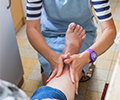Tag Archives: COMPASS

March 2020 Br J Cardiol 2020;27(suppl 1):S15–S20 doi:10.5837/bjc2020.s04
Combining rivaroxaban with aspirin in stable atherosclerotic vascular disease: clinical evidence from the COMPASS study
Subramanya G N Upadhyaya, Vinoda Sharma, Derek Connolly
| Full textOctober 2017
ESC 2017: COMPASS steers on anticoagulation in stable cardiovascular disease
Chris Allen
| Full text

